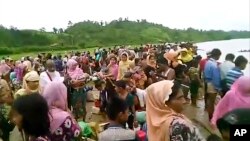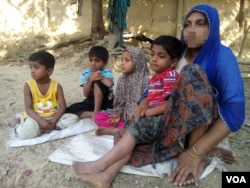Aid agencies warn the mass exodus of Rohingyas is not over. Myanmar has seen more than one-half million refugees flee into neighboring Bangladesh since August 25.
The International Organization for Migration (IOM) reports an estimated 2,000 Rohingya refugees are arriving daily at Cox's Bazar in Bangladesh. The agency said as many as 100,000 more people may be waiting to cross from North Rakhine State.
U.N. Under-Secretary-General for Humanitarian Affairs and Emergency Relief Coordinator, Mark Lowcock, has just returned from a visit to Cox's Bazar. He calls this the fastest-growing refugee crisis in the world and one of the most heart-rending.
While in Bangladesh, he said he heard horrific stories of abuse and atrocities suffered by the refugees at the hands of the Myanmar military.
"I sat down with 24 women who had also fled," he said. "And they told me their stories, stories of being forced to watch while their husbands, their fathers, their young sons were killed in front of their eyes. Stories of rape, really, violent sexual assault. Stories of then having to flee as their villages were burned."
Lowcock said conditions in Bangladesh are very difficult. He said people are living in overcrowded, squalid settlements. They need food, he said, better water and sanitation, and better basic services.
He said U.N. and international agencies are scaling up humanitarian operations and this has resulted in a marked improvement in the delivery of life-saving aid. But, he said the needs are so great that even this is not enough.
The U.N. has come up with a $434 million response plan to help 1.2 million Rohingya and the Bangladeshi host community. Lowack said the U.N. will host a pledging conference in Geneva on October 23.
He noted the origin of the Rohingya crisis is in Myanmar and the solutions also must be in Myanmar.





